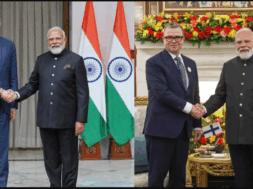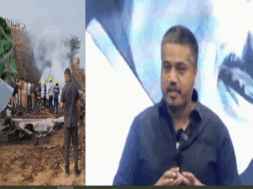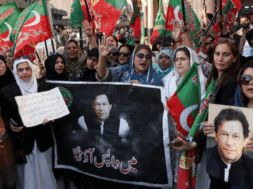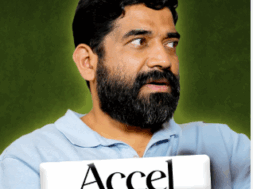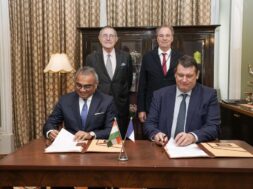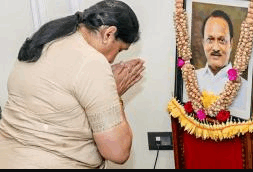
Amit Shah Plotted Violence, Murder in Canada: Says Canadian Official, Minister
Manas Dasgupta
NEW DELHI, Oct 30: The Canadian Prime Minister Justin Trudeau’s national security and intelligence adviser Nathalie Drouin along with a Canadian minister had deliberately “leaked” the so-called “secret information” to a US-based newspaper that the union Home Minister Amit Shah had ordered a campaign of violence, intimidation and intelligence gathering targeting Sikh separatists inside Canada.
Ms Drouin has acknowledged leaking sensitive information to The Washington Post regarding the Indian government’s alleged involvement in hostile activities on the Canadian soil. The information — leaked by Nathalie Drouin and David Morrison, deputy minister of foreign affairs — implicated India’s Home Affairs Minister Amit Shah as allegedly directing such actions from New Delhi.
At a parliamentary committee meeting, Drouin said she and Deputy Foreign Minister David Morrison crafted the communications strategy under which she leaked the so-called intelligence to The Post to get the Canadian story in the public domain. “We made a strategic decision to engage a respected international news outlet that had already published on the subject to ensure the record was straight and that our side of the story would be widely heard,” said Ms Drouin.
Deputy Foreign Affairs Minister David Morrison also told the Parliament members of the national security committee that he had confirmed Mr Shah’s name to The Washington Post, which first reported the allegations. “The journalist called me and asked if it was that person. I confirmed it was that person,” Mr Morrison told the committee. Mr Morrison did not say how Canada knew of Mr Shah’s alleged involvement.
Earlier this month, after Canadian Prime Minister Justin Trudeau’s administration went after Indian High Commissioner Sanjay Kumar Verma and other diplomats, a story appeared in The Post that reported that Canada believed Home Minister Amit Shah had directed a campaign of violence, intimidation, and targeted intelligence-gathering inside Canada. The India-Canada relations plunged last year when Trudeau accused India of being involved in the killing of Hardeep Singh Nijjar, a Khalistani terrorist leader killed in Surrey earlier in the year.
Testifying before the Commons public safety committee, Ms Drouin stated that she did not need Trudeau’s authorization to leak the information. She also clarified that no classified intelligence was shared with The Washington Post, which published the details a day before India recalled six Indian diplomats over Thanksgiving even as Canada claimed to have expelled them.
Another journal The Globe and Mail had also reported that the leaked information not only pointed to Mr Shah but also connected India to the killing of Sikh activist Sukhdool Singh Gill, who was shot in Winnipeg on September 20, 2023. This incident occurred two days after Trudeau’s statement in the House of Commons alleging India’s involvement in the June 2023 murder of Sikh separatist leader Hardeep Singh Nijjar in Surrey, B.C. While no charges have been filed in Gill’s case, RCMP Commissioner Mike Duheme noted on October 14 that evidence implicated India in several killings, although only Nijjar’s name was specified.
Ms Drouin stated that the decision to leak information to The Washington Post was part of a strategy she and Morrison devised to ensure a major US outlet reported on Canada’s stance in its escalating foreign-interference dispute with India. The strategy, she added, was seen by the Prime Minister’s Office.
“We provided non-classified information on our actions and the evidence linking the Indian government to illegal activities targeting Canadians, including life-threatening threats,” Ms Drouin testified, adding that similar briefings were shared with Canadian opposition leaders. Ms Drouin said Canada has evidence the Indian government first gathered information on Indian nationals and Canadian citizens in Canada through diplomatic channels and proxies.
When Conservative public safety critic Raquel Dancho asked why information was shared with The Washington Post before being made available to the Canadian public. “Canadians wouldn’t know unless they were able to read The Washington Post. I find it unfair that details were released to them but not provided to Canadians,” she said.
When Dancho further asked why Canadians first learned from the U.S. publication of allegations against India’s Home Affairs Minister concerning hostile activities in Canada, Morrison explained that he confirmed Shah’s name when The Washington Post journalist mentioned it.
Commissioner Duheme said he did not release the information publicly, as it could interfere with ongoing investigations. “Its investigative material we typically keep internal,” he remarked, noting the intelligence shared with The Washington Post was not deemed classified under Canada’s national security standards.
Ms Drouin said the information was then passed to the government in New Delhi, which allegedly works with a criminal network affiliated with Lawrence Bishnoi. Lawrence Bishnoi is currently in prison in India, but Ms Drouin said his vast criminal network has been linked to “homicides, assassination plots, coercion and other violent crimes in Canada.”
Before the Royal Canadian Mounted Police went public with allegations that Indian diplomats were persons of interest in criminal investigations, Ms Drouin said there was an effort to work with the Indian government to ensure accountability. Ms Drouin said a meeting was held with Prime Minister Narendra Modi’s national security adviser, Ajit Doval, in Singapore two days earlier.
She said the decision was made to go public when it became evident the Indian government would not cooperate with Canada on proposed accountability measures. That included asking India to waive diplomatic immunity for the persons of interest, including the High Commissioner in Ottawa. Ms Drouin said this was not seen as likely.
The Royal Canadian Mounted Police said it took the extraordinary step of talking publicly about ongoing investigations because of threats to public safety. The Government denies the allegations and has expelled six Canadian diplomats in return.
Earlier this month, the Ministry of External Affairs (MEA) had lashed out at Canada’s “preposterous imputations” on the involvement of Indian diplomats in the Nijjar case, warning that India “reserves the right to take further steps in response.”
India had also ordered the expulsion of six Canadian diplomats, while also announcing its decision to withdraw the Indian High Commissioner to Canada and “other targeted diplomats” citing security concerns after Ottawa identified them as “persons of interest” in its investigation into Nijjar’s killing.
External Affairs minister S Jaishankar on Saturday had said that “On our side we have reasoned with the Canadian system saying ‘look don’t go down this extremist path.” “We completely reject the manner in which the Canadian government targeted our High Commissioner and diplomats…There are a small minority of people there, who have made themselves into what appears to be a bigger political voice…Today they are saying things about us, but if you look at who first raised the presence of organised crime in Canada. We were telling them and they were not listening…On our side we have reasoned with the Canadian system saying ‘look don’t go down this extremist path,” Mr Jaishankar had said.
Justin Trudeau had said a year ago that Canada had “credible evidence” that the “agents” of the Indian government were involved in the murder of Nijjar. Canadian authorities have repeatedly said they have shared evidence of that with Indian authorities but the Indian government officials have repeatedly denied Canada has provided any evidence and have called the allegations “absurd.”
Canada is not the only country that has accused Indian officials of plotting an assassination on foreign soil. The United States Justice Department announced criminal charges in mid-October against the Government employee in connection with an alleged foiled plot to kill a Sikh separatist leader living in New York City.
In the case announced by the Justice Department, Vikash Yadav, who authorities say directed the New York plot from India, faces murder-for-hire charges in a planned killing that prosecutors have previously said was meant to precede a string of other politically motivated murders in the United States and Canada.
Nijjar, 45, was fatally shot in his pickup truck after he left the Sikh temple he led in Surrey, British Columbia. An Indian-born citizen of Canada, he owned a plumbing business and was a leader in what remains of a once-strong movement to create an independent Sikh homeland. Four Indian nationals living in Canada were charged with Niijar’s murder and are awaiting trial.
Ms Drouin and Mr Morrison were called as witnesses at the committee alongside Royal Canadian Mounted Police Commissioner Mike Duheme, as well as the director of Canada’s spy service.
Meanwhile, the Indian diaspora in Canada has strongly reacted to the office of the Leader of Opposition in Canada suddenly cancelling the annual Diwali event for the Indo-Canadian community at Parliament Hill amid a diplomatic standoff with India. The Indian diaspora group the Overseas Friends of India Canada (OFIC) – organisers of the event – were not given any explanation regarding the cancellation of the event which was slated to be held on Wednesday.
The group flagged the issue in an open letter alleging “racial bias” by the Leader of the Opposition Pierre Poilievre. The latest move by Canada comes as the country’s tensions with India have peaked at an all-time high in recent weeks over the killing of Nijjar last year.
Shiv Bhasker, President of the Overseas Friends of India Canada, voiced his dismay over the event cancellation stating that no explanation was given by the office of the Leader of Opposition for the event which had been organised for the last 23 years and had seen the participation of Hindus, Buddhist, Jains, and Sikhs.
“However, the sudden withdrawal of political leaders from this event, prompted by the current diplomatic situation between Canada and India, has left us feeling betrayed and unjustly singled out,” Bhasker said. He raised concerns over the failure of the Canadian leaders to attend the cultural event “particularly at such a delicate time,” sending a “clear message to Indo-Canadians that we are being viewed not as fellow Canadians, but as outsiders.”
“By cancelling their participation, our political leaders have failed to draw a necessary distinction between the Canadian Indian community and the actions of the Indian government. In doing so, they have unwittingly reinforced the very stereotypes and racial biases they claim to stand against,” the group’s President said.
Mr Bhasker mentioned the racism and discrimination in Canada and said the fresh move to cancel the Diwali event has only affirmed the “systemic biases that still exist.” “This is not just about a cancelled Diwali event or an event where the politicians decide to reengage on their commitment to attend; it is about a much deeper, more insidious problem. Racism and discrimination are thriving in Canada, and this latest development has laid bare the systemic biases that still exist,” he said.
“This is unacceptable. We are proud Canadians, and our identity is rooted in this country, not in the political machinations of another nation,” he added. Diaspora group demanded an apology for the “insensitive and discriminatory act” of the Office of the Leader of the Opposition and said they expect actionable course of action to address the “systemic racism and bias that led to this decision.” “We need to see a commitment to ensuring that no community in Canada is ever made to feel like second-class citizens because of their cultural or ethnic background,” he said.
